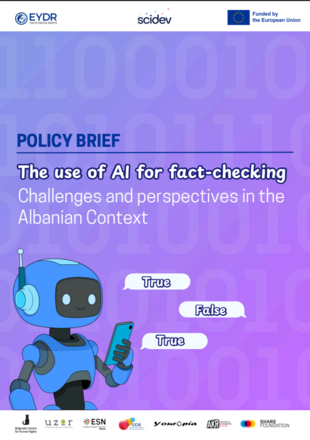
This policy brief examines how artificial intelligence (AI) is influencing fact-checking, combining global insights with perspectives from Albanian journalists, editors, academics, and fact-checkers. Interviews show that AI is viewed as a helpful but unreliable assistant: it can speed up tasks such as source comparison, metadata extraction, and content summarization, but often lacks contextual understanding and accuracy. As a result, AI-generated outputs frequently require additional verification, sometimes increasing workload instead of reducing it.
The brief voices ethical concerns, particularly about accountability, transparency, and editorial responsibility. Many stressed that fact-checking requires human judgement, which AI cannot replace. AI use in newsrooms also remains stigmatized, leading to informal, undisclosed usage.
Despite skepticism, experts expect AI to become more relevant as tools improve and adapt to local needs. The brief highlights the importance of media and AI literacy for both journalists and the public and recommends ethical AI guidelines, educational integration, shared fact-checking databases, and stronger research partnerships.
Tags: Albania Fact-checking Media freedomThe content of this article can be used according to the terms of Creative Commons: Attribution-NonCommercial 4.0 International (CC BY-NC 4.0) . To do so use the the wording "this article was originally published on the Resource Centre on Media Freedom in Europe" including a direct active link to the original article page.

